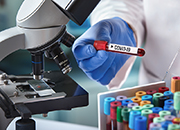- Could Your Grocery Store Meat Be Causing Recurring UTIs?
- Are You Making This Expensive Thermostat Error This Winter?
- Recognizing the Signs of Hypothyroidism
- 10 Strategies to Overcome Insomnia
- Could Artificial Sweeteners Be Aging the Brain Faster?
- Techniques for Soothing Your Nervous System
- Does the Water in Your House Smell Funny? Here’s Why
- Can a Daily Dose of Apple Cider Vinegar Actually Aid Weight Loss?
- 6 Health Beverages That Can Actually Spike Your Blood Sugar
- Treatment Options for Social Anxiety Disorder
Scientists Find Source of COVID Clots

COVID-19 is linked to potentially fatal blood clots. Researchers now believe they’ve found out how they occur, which potentially could lead to better treatment.
“While many forms of illness can generate blood clots, the endothelial cells that line the inside of blood vessels play a surprisingly large role in COVID-19 clotting,” said researcher Dr. Alfred Lee, an associate professor of medicine at Yale Cancer Center.
“Endothelial damage is a central component in the entire spectrum of COVID-19 disease. Our study is the first to demonstrate that this process of endothelial damage is present in a wide range of COVID-19 patients, particularly as people become critically ill,” Lee said in a Yale news release.
For the study, Lee and his team examined the blood of 68 patients with COVID-19. Of these patients, 48 were critically ill in an ICU. The other 20 were hospitalized but not in the ICU.
The researchers found that some markers of endothelial cell and blood platelet activation were nearly twice as high in the ICU patients compared to those not in the ICU.
One marker, called thrombomodulin, was linked with survival among all patients. Measuring thrombomodulin might help doctors better treat patients, the researchers say.
“If we have a marker to identify which patients are most likely to progress towards critical illness and possibly death, that would be hugely helpful, as these patients might benefit from closer monitoring and possibly earlier intervention,” Lee said.
Study co-author Dr. Hyung Chun is trying to develop a test based on thrombomodulin, which is elevated in other life-threatening diseases as well.
“The other goal we’re pursuing in parallel is to find therapeutic strategies that could safeguard the endothelial layer and may prevent the blood clots from forming,” said Chun, an associate professor of medicine and pathology at Yale School of Medicine. “Are there approved drugs we could potentially repurpose for this context?”
One possible candidate is the drug dipyridamole, used to prevent stroke.
The report was published June 30 in the journal The Lancet Haematology.
More information
For more on COVID-19, see the U.S. Centers for Disease Control and Prevention.
Source: HealthDay
Copyright © 2026 HealthDay. All rights reserved.










